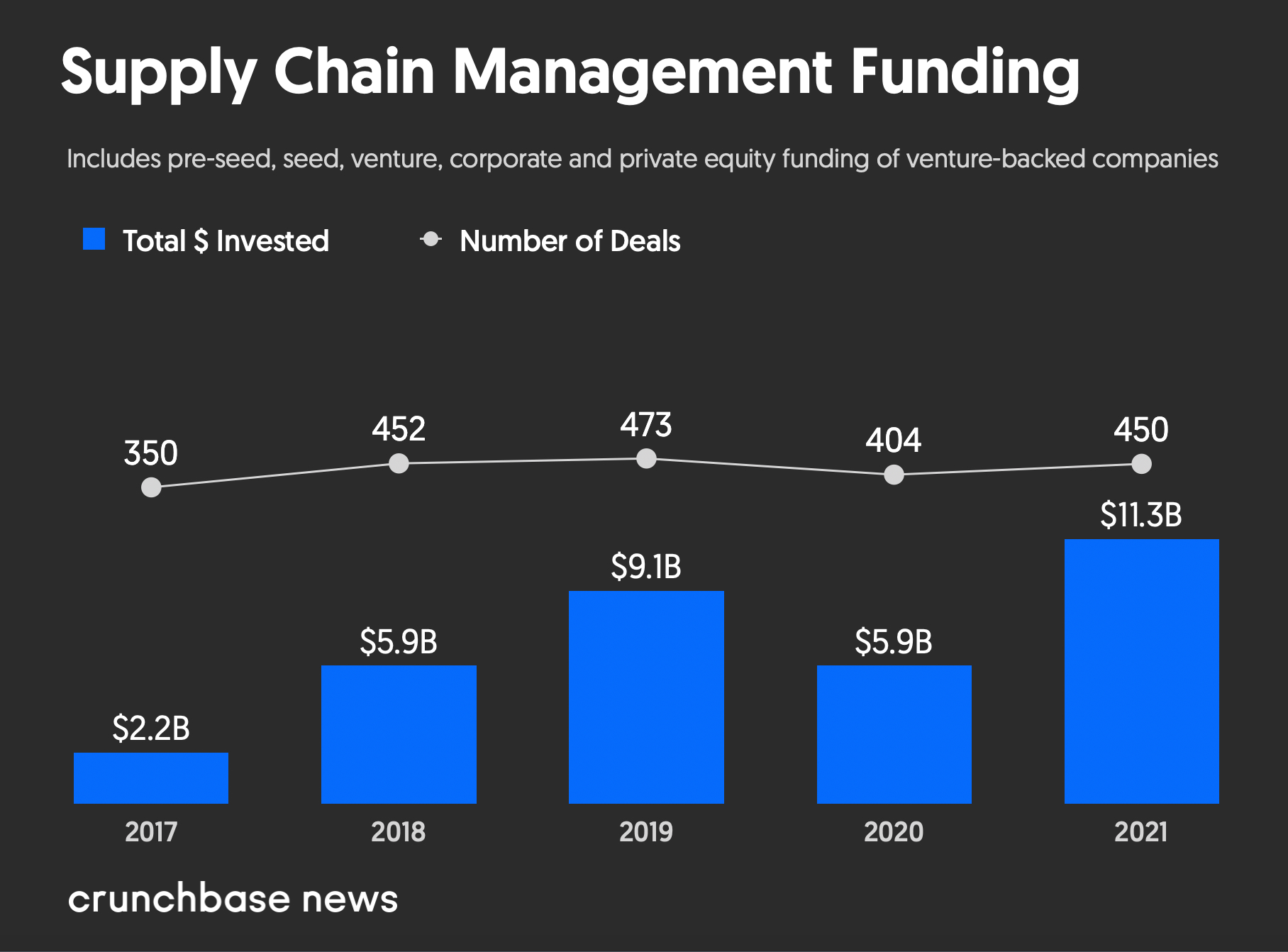Nearly two years into the pandemic, supply chain disruptions still dominate headlines, as do large funding rounds by tech companies aiming to solve the problem.
Last year was a banner year for venture-backed supply chain management companies, which saw $11.3 billion in funding, according to Crunchbase numbers. That represents almost a twofold increase from 2020 and easily beats the previous all-time high in 2019 which saw $9.1 billion go to startups that look to keep the supply chain moving.

The numbers show not just the effects of the pandemic that shocked every aspect of the supply chain, but something more. They represent a building acceptance of tech in an industry known to run on pen, paper and spreadsheets, experts say.
“I think in the last five years the industry realized they were going to get left behind if they didn’t make the change,” said Rudina Seseri, founder and managing partner of Glasswing Ventures, which last month participated in the $25 million Series B of Atlanta-based supply chain intelligence company Verusen.
“Then COVID came and made it incredibly obvious and accelerated the adoption,” she added.
Big deals
While the dollar amount in the space exploded, deal count did not: Last year saw a slight increase in deals compared to 2020—450 versus 404—but the number was still below the 473 deals the industry saw in 2019.
However, big deals have helped pump up dollar amounts. Last year witnessed nine venture-backed supply chain management companies raise rounds of a quarter-billion-dollars or more compared to just five in 2020. That heat in the sector does not seem to be lessening either.
Already this year investors have pumped nearly $1.9 billion into the space, including a handful of large deals:
- Chicago-based Project44, a supply chain visibility platform, raised a $420 million funding round at a pre-money valuation of $2.2 billion;
- Ottawa-based Assent Compliance, a provider of cloud-based solutions for product compliance and vendor management, closed a $350 million Series D in January;
- France-based Exotec, a robotics order preparation platform, raised a Series D worth approximately $333 million, also last month; and
- Chicago-based Loadsmart, a logistics platform that helps carriers optimize loads, closed a $200 million Series D earlier this month.
Risk vs. reward
To understand what’s happening in the supply chain space, it’s important to look at those who manage it. These operators strive to optimize the flow of goods—so materials come in just at the right moment to lessen any down time. When that happens, revenue is maximized.
However, the pandemic started to change those rules, as companies needed more visibility and insight into their ever-changing supply chain, as well as looked for alternatives when severe disruptions occurred. An industry that used to rely on optimization tools based on historical data could no longer do so in a world seemingly changing by the hour.
“Because of the pandemic ‘good enough’ is no longer good enough,” said Paul Noble, CEO of Verusen, which helps companies manage materials across their supply chain network with the help of artificial intelligence.
“It really created a heightened awareness,” he said.
That also created a thirst for SaaS solutions in an industry slow to change—in turn producing an easier path for supply chain startups to show product-market fit.
“Every organization in the world now has these problems,” said Noble, who described raising his Series B as “smooth” and “competitive” after seeing a lot of interest from investors.
Julian Alvarez, CEO and founder of Seattle-based Logixboard—a customer engagement platform designed to help companies manage freight operations—said even how people in the space view it has changed in three years.
While the supply chain used to be looked at as something that was just a cost, companies are now seeing how having the right materials and delivering on time can help an organization.
“Software is turning (the supply chain) from a cost center to a profit center,” said Alvarez, whose company raised a $32 million Series B last month.
Investing in the chain
The supply chain problems being experienced by companies are also being noticed by investors.
“No one cared about this space just a few years ago,” said Teddie Wardi, managing director at Insight Partners. “Not just investors, but I mean, everyone. Now, we have seen about 10 years of transformation in two.”
Insight itself has invested in a handful of companies in the space like Chicago-based Project44, Florida-based PayCargo and Seattle-based Logixboard.
Wardi said Insight has always looked at the space, mainly due to the fact it is a big market—only construction has a bigger GDP—and most processes in the sector are still manual.
“We look at software that can transform this and create efficiencies—doing it at a large scale,” he said.
Seseri said tech around things like systems of record and logistics, especially those platforms that leverage AI, are attractive to investors.
While startups in the space are still proliferating, some investors have already seen exits. One of the more prominent deals in the space occurred in 2020, when payment procurement platform Coupa Software acquired Ann Arbor, Michigan-based LLamasoft, an AI-powered supply chain design and planning platform. Project44 made three deals last year alone, including buying Austin, Texas-based customer delivery intel platform Convey for $255 million in September.
Nevertheless, many say it is still early innings in a space just getting its legs and being looked at by investors.
“There’s definitely some more excitement in the space,” Wardi said. “But it is a space that is slightly more complex to understand.”
Illustration: Li-Anne Dias

Stay up to date with recent funding rounds, acquisitions, and more with the Crunchbase Daily.












67.1K Followers